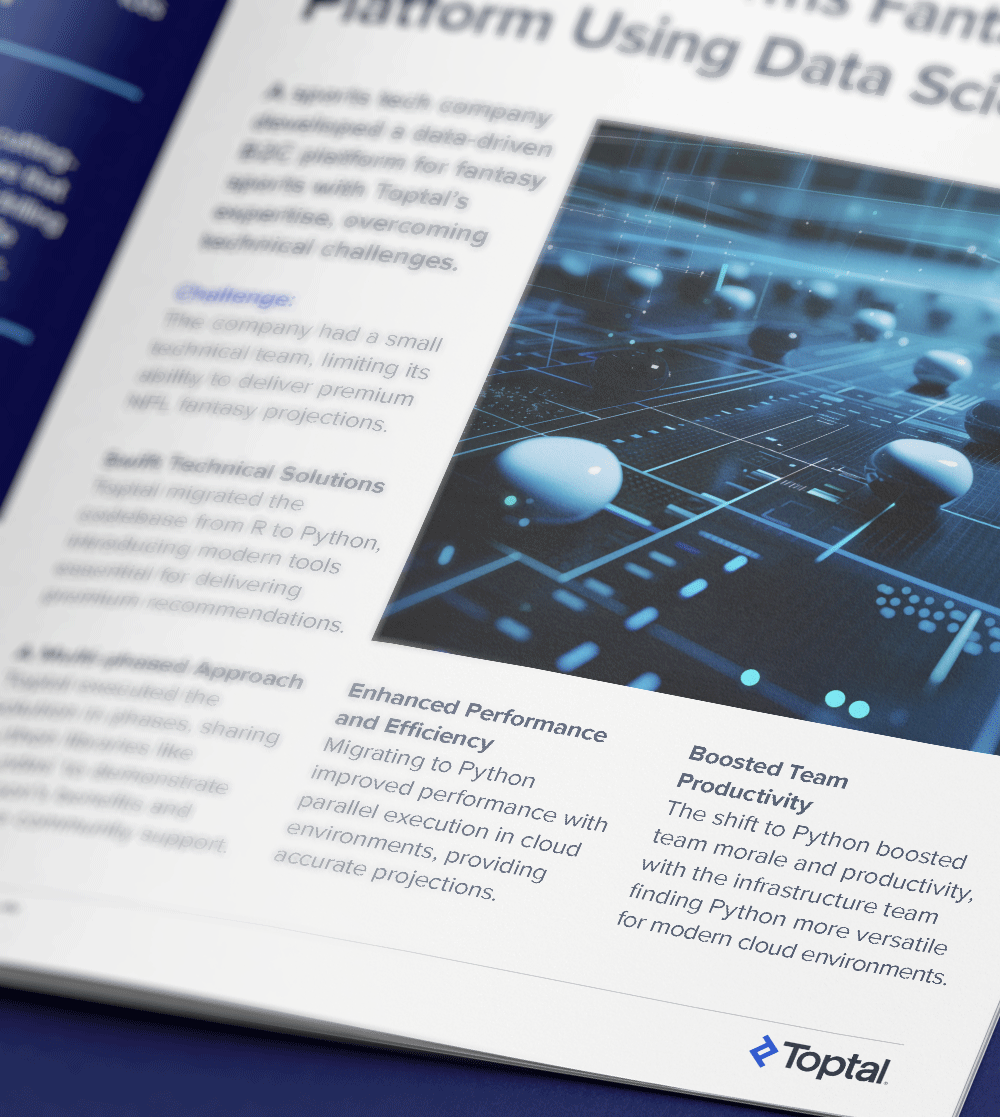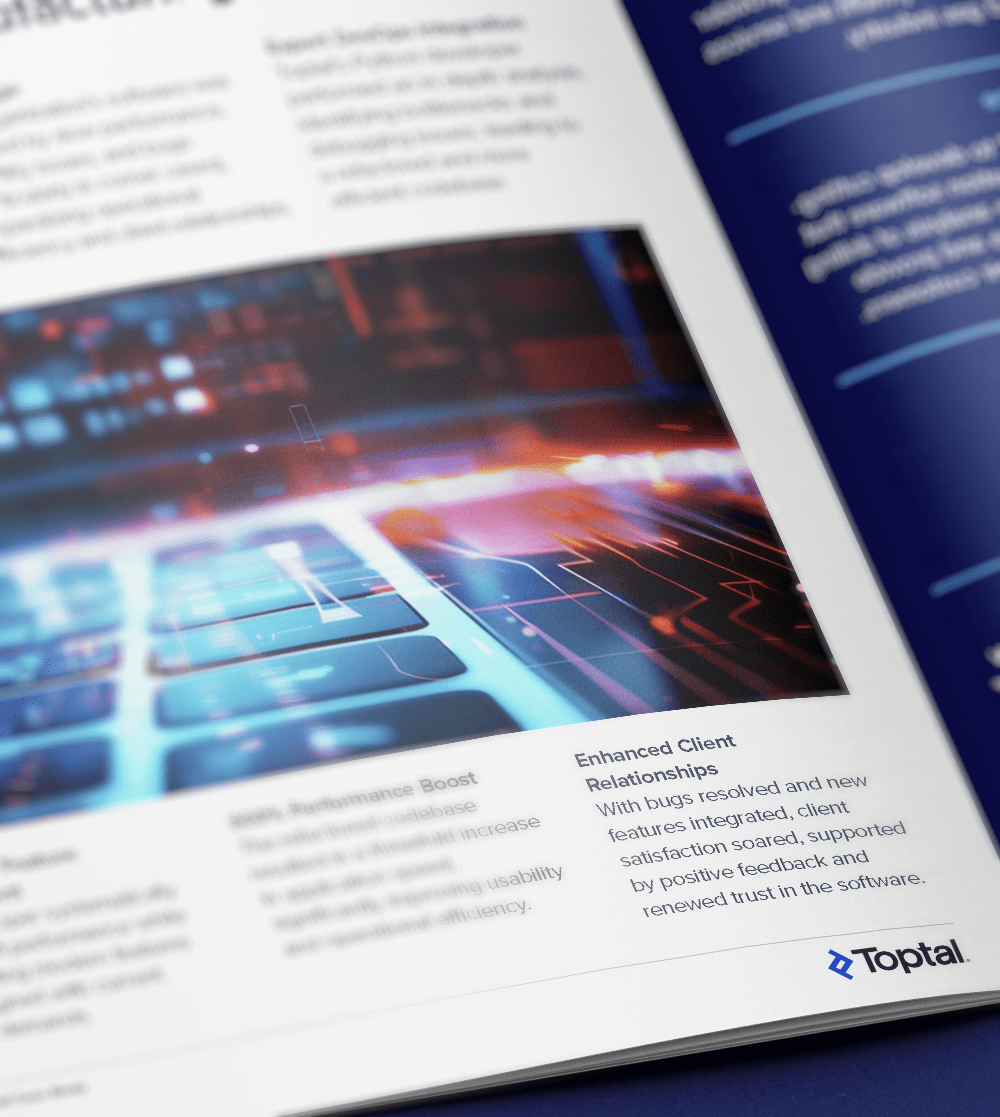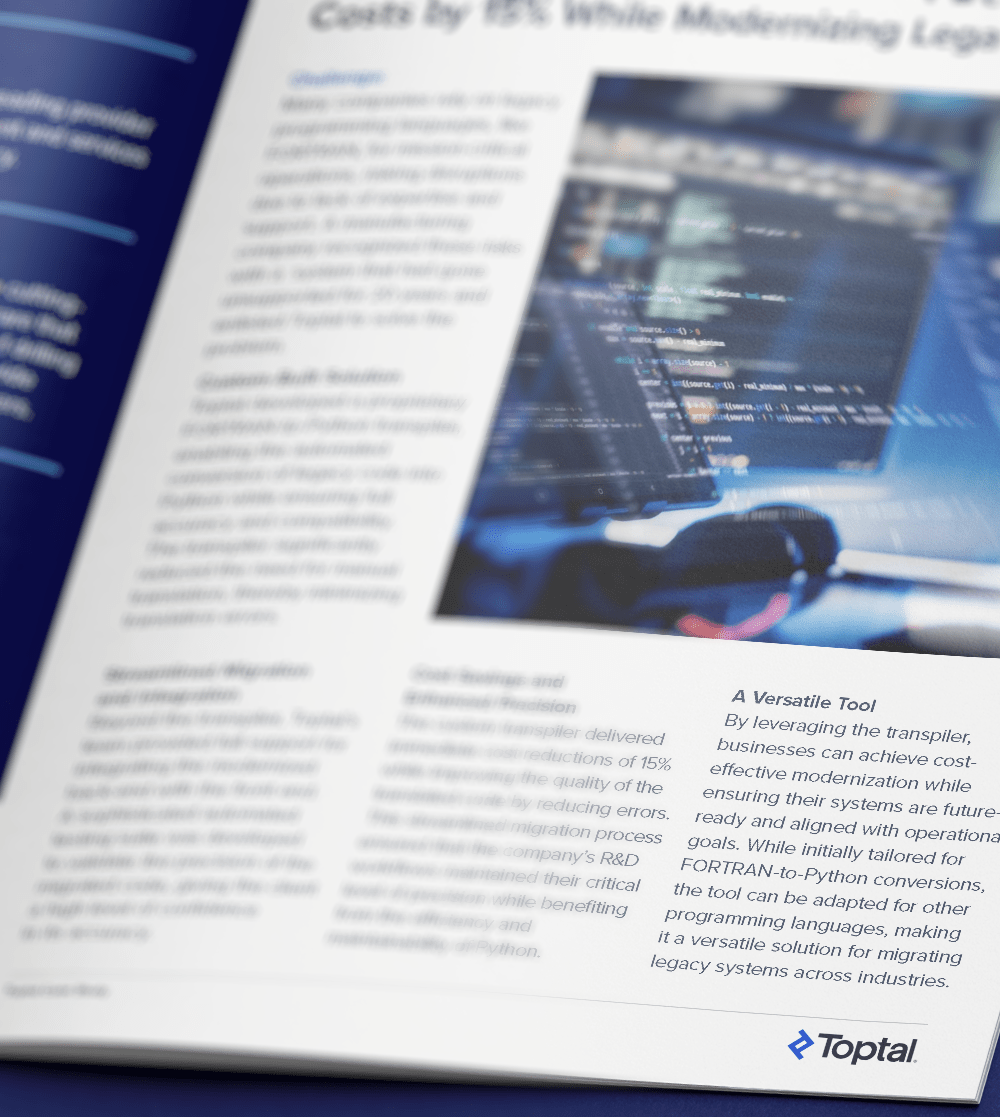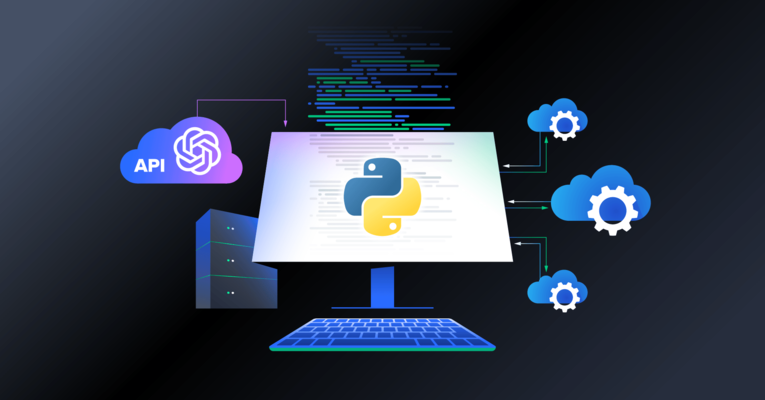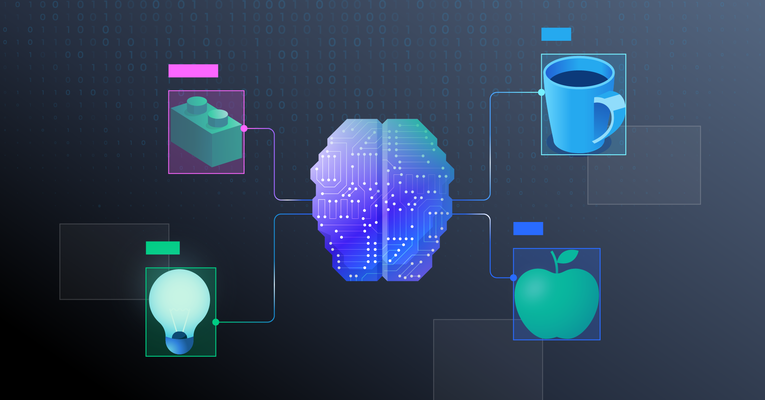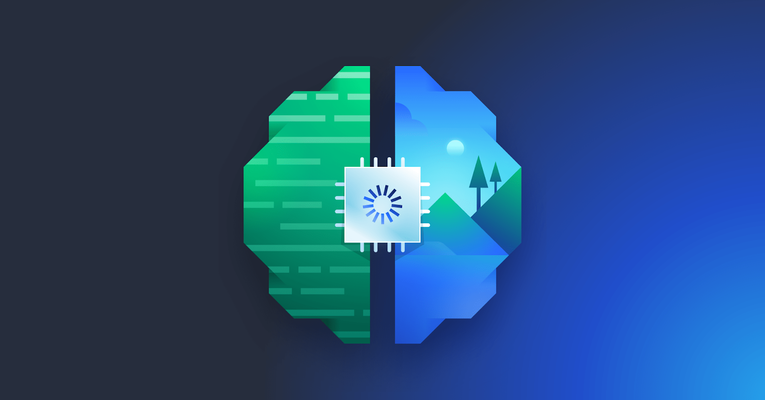
Hire Python Developers
Hire the Top 3% of Freelance Python Developers
Hire Python developers, programmers, coders, experts, and engineers on demand. Top companies and startups choose Python developers from Toptal for data engineering, back-end development, machine learning, automation scripting, and more.
No-Risk Trial, Pay Only If Satisfied.
Hire Freelance Python Developers
Oliver Schoenborn
After years of developing distributed simulation systems for VR, Oliver's focused on DevOps engineering, particularly automation since 2017: (1) combining Terraform, Python, and Docker to automate the provisioning of Kubernetes clusters and cloud resources used by microservices deployed into those clusters; (2) engineering CI/CD pipelines; and (3) managing k8s clusters and helping developers integrate their work into it, standardizing in-house helm charts, and containerizing legacy applications.
Show MoreCamille Potard
Camille is a senior software developer with 20 years of experience building desktop applications for notable clients, such as E-on software, Hitachi, and Alstom. His primary expertise includes C, C++, Python, and real-time technologies with 3D software, in railway, power, video, imaging, and web domains. Camille thrives in remote environments with small or medium-sized teams.
Show MoreLukasz Jaworowski
Lukasz is a seasoned freelance Python developer and web scraping expert with a proven track record as a tech lead. He's successfully guided startups and managed corporate projects, turning complex challenges into scalable solutions. Lukasz's expertise spans Python, Go, PySpark, AWS, and modern DevOps tools, making him a reliable partner for innovative data-driven projects.
Show MoreNeil Gulati
Neil has over 25 years of experience in network and application programming, recently focusing on Python REST APIs using DRF, Redis, RabbitMQ, Apache Pulsar, and CouchDB. He also has solid expertise in JavaScript, C, C++, PHP, Perl, CSS, and HTML. He has pushed the Django object-relational mapper to the limit and has used Postgres, MySQL, MS SQL Server, Oracle, and IBM DB2. Neil thrives in the Linux CLI environment using Vim, Tmux, and Bash and embraces the DevOps revolution and Kubernetes.
Show MoreBarbara Prusiewicz
Barbara is a full-stack developer specializing in front-end development with expertise in React frameworks. Her passion is bringing user experiences to life. She was a software architect (C/C++) for point-of-sale terminals. Barbara designed and developed Verifone's Vx Contactless Card Payment app, which performs contactless card-based transactions used worldwide. This background provides her with a strong foundation in software engineering, development tools, and teamwork.
Show MoreKirill Stepanov
Kirill has been making a living as a developer since 2012. He's worked with the usual range of web technologies, including a bit of front-end development, but most of his development experience has been in PHP and Python, including Django and Flask. Kirill also has a wealth of certified experience working remotely and successfully delivering projects.
Show MoreMichael Harvey
Mike is a senior developer with three decades of experience building software for embedded systems and cloud platforms, including more than 15 years at Intel. He has substantial experience with Linux, C, C++, Python, and Java and has worked with media technologies, networking, eCommerce, and payments. Mike is an experienced technical lead.
Show MoreCharles Demontigny
Charles is a senior data scientist with 6+ years of experience in Python programming, SQL, predictive analytics, and data-driven marketing on the Google Cloud Platform. He's been working with a wide variety of clients, from startups to Fortune 500 companies. Charles has a good understanding of the business aspects behind the technical work, and he can deliver through the entire data pipeline process while analyzing large datasets using data science techniques and dashboards.
Show MoreAhmed Farghal
Ahmed is a software and systems engineer carrying over 15 years of experience designing and implementing highly scalable applications. He is mainly a C++, Rust, Python, Scala, and Java developer but can fluently work with nearly 10 programming languages and frameworks. He is a functional programming evangelist, the author of a book titled "Getting Started with Memcached," and a reviewer of several Python programming books.
Show MoreJason Haury
Jason is a senior back-end developer with 14 years of Python experience. A recent example of his Python work is when Jason created a Python client to interact with Stocktwits (a financial social media site) to scan users' messages for sentiment analysis. Besides having a solid educational background with a master's degree in electrical engineering, Jason's adept at data engineering and analytics from SQL to Pandas.
Show MoreLeandro Lima
Leandro has over 20 years of experience with IT and has been working with Python since 2013. He has excellent analytical skills, combined with the know-how from combined years of experience and a degree in electrical engineering, and a passion for building efficient and cost-effective systems.
Show MoreLast updated: Dec 30, 2025
Discover More Python Developers in the Toptal Network
Start HiringA Hiring Guide
Guide to Hiring a Great Python Developer
Python is one of the most popular programming languages today—it’s used in many high-growth fields, such as deep learning, automation, and data manipulation—and Python developers are in high demand. This Python hiring guide offers insight into the skill requirements and interview questions that will connect you with the right experts for your project.
Read Hiring GuidePython Hiring Resources
More Resources to Hire Python Developers
Job Description TemplateInterview QuestionsCommon MistakesTips and PracticesJobs... allows corporations to quickly assemble teams that have the right skills for specific projects.

Despite accelerating demand for coders, Toptal prides itself on almost Ivy League-level vetting.









How to Hire Python Programmers Through Toptal
Talk to One of Our Client Advisors
Work With Hand-selected Talent
The Right Fit, Guaranteed
EXCEPTIONAL TALENT
How We Source the Top 3% of Python Developers
Our name “Toptal” comes from Top Talent—meaning we constantly strive to find and work with the best from around the world. Our rigorous screening process identifies experts in their domains who have passion and drive.
Of the thousands of applications Toptal sees each month, typically fewer than 3% are accepted.
Toptal Python Case Studies
Discover how our Python developers help the world’s top companies drive innovation at scale.
Capabilities of Python Developers
Leverage Python’s versatility with Toptal developers, who take advantage of its extensive libraries and frameworks to build reliable, high-performance business solutions, including custom data analytics, AI implementation, scalable web applications, and automation systems.
AI and Machine Learning With Python
Python for Big Data and Analytics
API Development and Integration
Tailored Application Development
Web Development With Django and Flask
IoT and Embedded Systems With Python
Automation and Scripting
Python Frameworks
Find the Right Talent for Every Project
Full-stack Python Developers
Dedicated Python Developers
Offshore Python Developers
Remote Python Developers
FAQs
The cost associated with hiring a Python developer depends on various factors, including preferred talent location, complexity and size of the project you’re hiring for, seniority, engagement commitment (hourly, part-time, or full-time), and more. In the US, for example, Glassdoor’s reported average total annual pay for Python developers is $88,000 to $129,000 as of January 23, 2024. With Toptal, you can speak with an expert talent matcher who will help you understand the cost of talent with the right skills and seniority level for your needs. To get started, schedule a call with us — it’s free, and there’s no obligation to hire with Toptal.
Typically, you can hire Python developers with Toptal in about 48 hours. For larger teams of talent or Managed Delivery, timelines may vary. Our talent matchers are highly skilled in the same fields they’re matching in—they’re not recruiters or HR reps. They’ll work with you to understand your goals, technical needs, and team dynamics, and match you with ideal candidates from our vetted global talent network.
Once you select your Python expert, you’ll have a no-risk trial period to ensure they’re the perfect fit. Our matching process has a 98% trial-to-hire rate, so you can rest assured that you’re getting the best fit every time.
Python developers are in extremely high demand, especially those who specialize in the most sought-after skill sets. They are able to quickly develop web applications, build data pipelines, and automate workloads. Their ability to tap into a rich ecosystem to solve novel problems makes Python developers a valuable addition to the right team.
Know yourself and know your candidate. Determine exactly what you need and what you’re willing to pay. Recruit from a wide pool but narrow it down quickly so you can thoroughly vet the candidates. Be ready to adapt your hiring process as market conditions change or as you learn more information about the candidates.
To hire the right Python engineer, it’s important to evaluate a candidate’s experience, technical skills, and communication skills. You’ll also want to consider the fit with your particular industry, company, and project. Toptal’s rigorous screening process ensures that every member of our network has excellent experience and skills, and our team will match you with the perfect Python developers for your project.
At Toptal, we thoroughly screen our Python architects to ensure we only match you with the highest caliber of talent. Of the more than 200,000 people who apply to join the Toptal network each year, fewer than 3% make the cut.
In addition to screening for industry-leading expertise, we also assess candidates’ language and interpersonal skills to ensure that you have a smooth working relationship.
When you hire dedicated Python developers with Toptal, you’ll always work with world-class, custom-matched Python developers ready to help you achieve your goals.
You can hire Python experts on an hourly, part-time, or full-time basis. Toptal can also manage the entire project from end-to-end with our Managed Delivery offering. Whether you hire a Python developer for a full- or part-time position, you’ll have the control and flexibility to scale your team up or down as your needs evolve. Our Python developers can fully integrate into your existing team for a seamless working experience.
We make sure that each engagement between you and your Python developer begins with a trial period of up to two weeks. This means that you have time to confirm the engagement will be successful. If you’re completely satisfied with the results, we’ll bill you for the time and continue the engagement for as long as you’d like. If you’re not completely satisfied, you won’t be billed. From there, we can either part ways, or we can provide you with another Python developer who may be a better fit and with whom we will begin a second, no-risk trial.
Explore Related Toptal Services
Looking for an end-to-end business solution? Browse Toptal's portfolio of services.

How to Hire Python Developers
Demand for Python Developers Continues to Expand
Python is one of the most in-demand software development skills in the market today. According to Stack Overflow’s 2025 Developer Survey, Python ranks as the fourth most popular programming language, just behind SQL, and it’s used extensively in many fields and industries, including data science, artificial intelligence (AI), cybersecurity, and finance, among others.
It’s easy to see why: Python is dominant in many high-growth areas, including data visualization and manipulation, deep learning, and workflow automation. Even in areas traditionally dominated by other languages—for example, e-commerce web development—Python is a popular language and offers powerful tools and extensive libraries built by its active community of developers. Potential Python applications range from natural language processing, topic modeling, and mathematical programming to social media analysis and cash flow modeling.
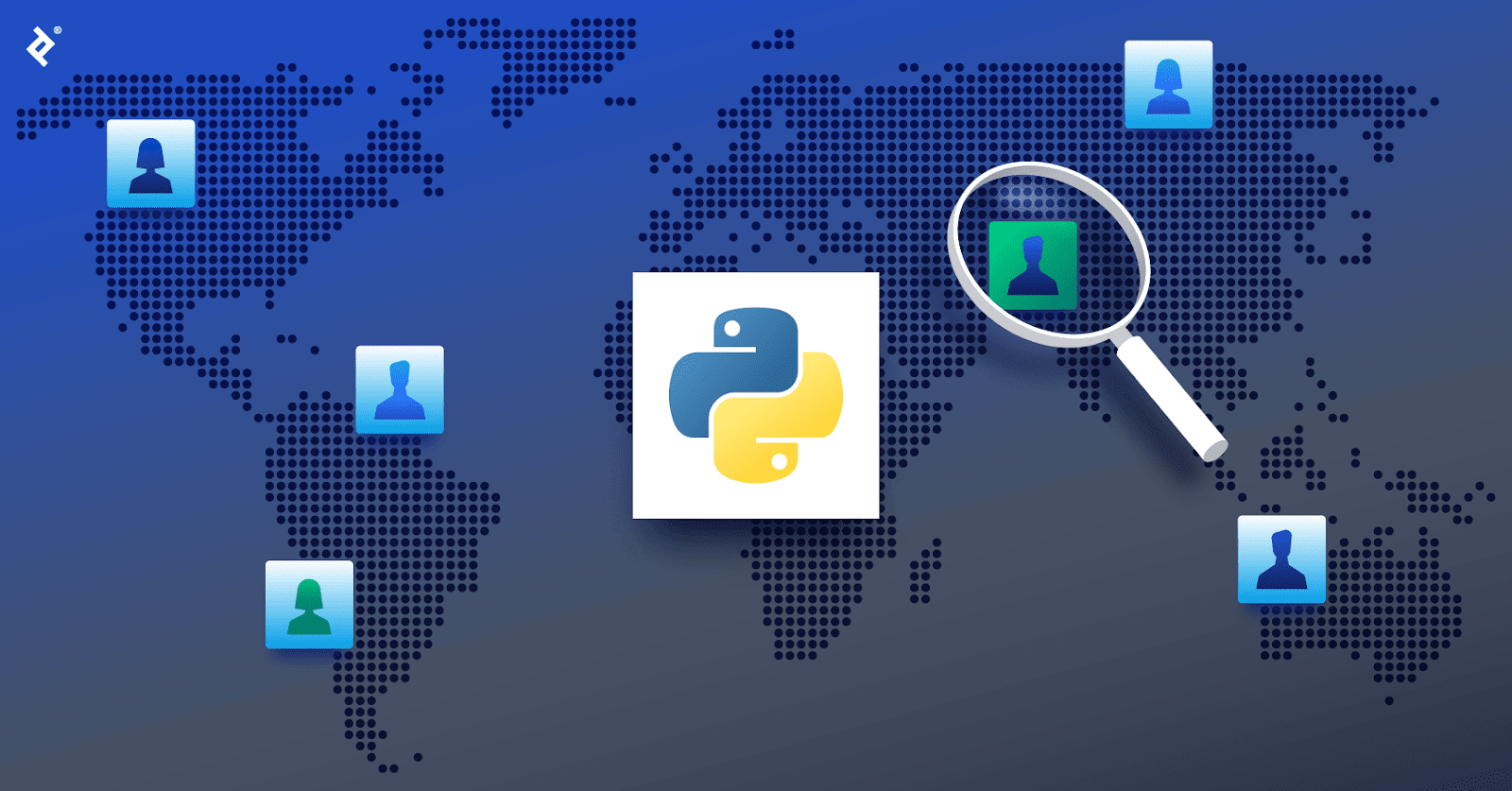
The power and versatility of Python present two challenges for companies looking to hire the best Python programmers for their needs: How to hire a developer who knows enough Python to effectively leverage its power yet avoid its pitfalls, and how to hire a Python developer who’s an expert in the specific industry you’re hiring for. As demand continues to rise, senior Python developer salary expectations have followed suit—particularly for roles involving cloud infrastructure, AI, and data engineering—making it even more important to define project needs clearly from the outset.
This hiring guide provides an overview of the market for Python developers and lays out the hiring process to find the best candidate for your business’s needs, including tips and questions for conducting technical interviews and crafting job descriptions.
What Attributes Distinguish Quality Python Developers From Others?
Good Python engineers tend to be specialist generalists: They have one or two skill sets in which they attain expert-level knowledge, but they also have a breadth of knowledge about a range of Python features and libraries. They should be able to draw upon Python’s extensive ecosystem to solve novel problems and be aware of common tricks and pitfalls of the language.
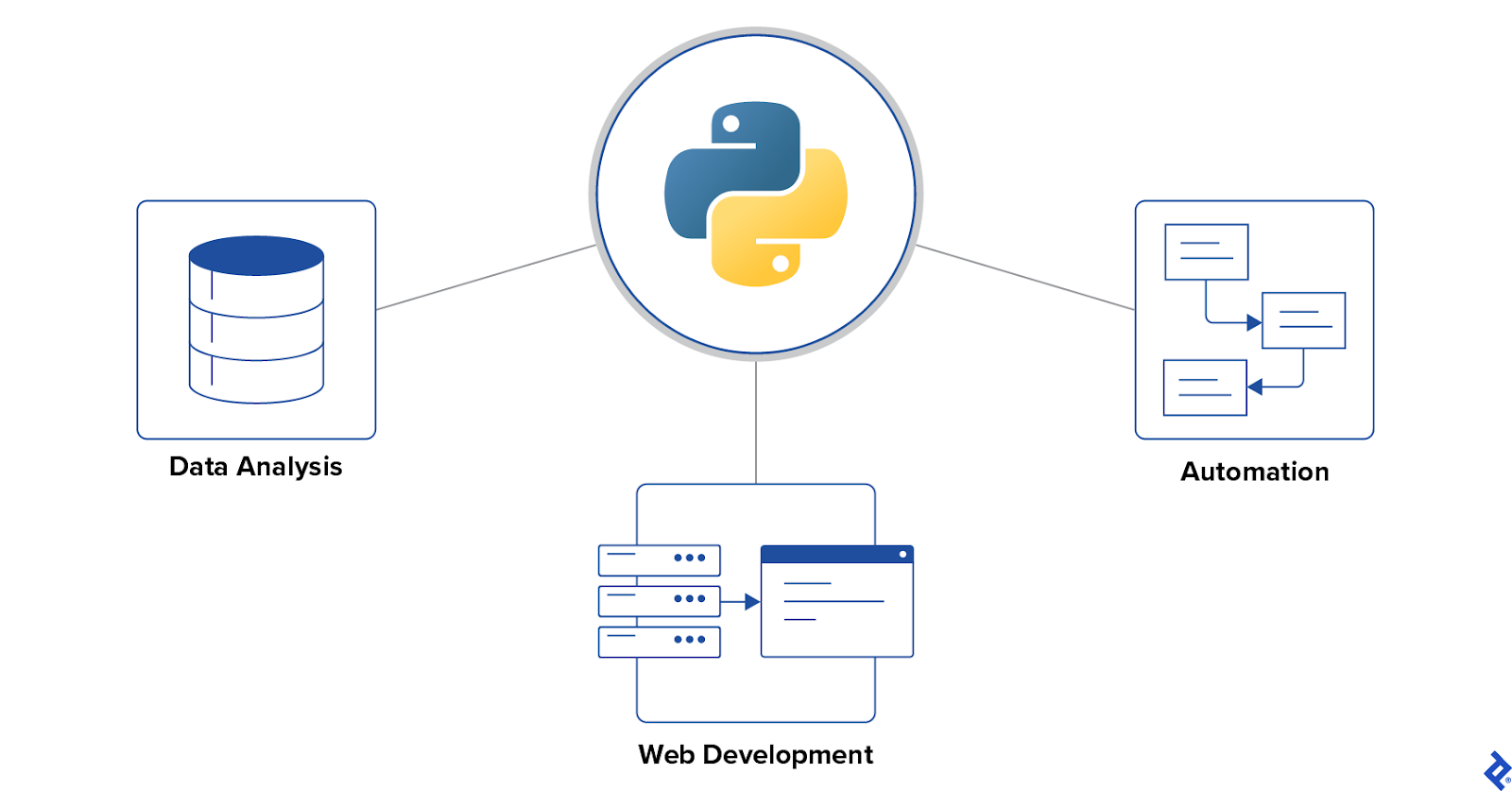
Businesses tend to rely on Python developers to work with data cleaning, data processing, and other quantitative tasks. They may also hire Python coders to build scalable web services, as Python’s ability to work with data allows a developer to quickly build data-backed applications. However, most businesses hire Python programmers for their versatility—the multidisciplinary nature of Python allows developers to draw upon a large set of resources in order to solve problems.
Good software developers should be able to leverage the unique advantages of the Python ecosystem. These advantages include but are not limited to:
Rapid API Prototyping: Developers can package a Python script as a web service or API using lightweight Python frameworks like Flask and FastAPI (or, for larger and more feature-rich applications, Django). Python is generally considered a fairly simple language to learn, making it an excellent choice for prototyping and rapid development.
Data Manipulation: A Python developer is able to inspect, analyze, and manipulate data using packages like pandas and NumPy, as well as built-in functions.
Data Modeling: An ideal candidate can explain how to use libraries like scikit-learn and statsmodels to quickly build statistical models after manipulating the data. Specialized technologies like TensorFlow and COIN-OR also have excellent Python integration, making these technologies accessible to a Python developer.
Interactive Programming: A Python developer is able to develop interactively using tools like Jupyter Notebook, allowing them to quickly develop functionality by “caching” time-consuming operations and modifying only small bits of code. They are also able to quickly visualize and inspect data within the interactive environment, speeding up their data analysis workflow.
Python Language Features: Due to their mastery of the common Python features that make development particularly quick and intuitive, a Python expert can use the language efficiently. These tools include data structures (e.g., collections), list manipulation functions (e.g., generators, itertools, and list comprehensions), object-oriented programming concepts (e.g., inheritance and polymorphism), and operating system libraries (e.g., os and subprocess).
Client Satisfaction and Engagement
Evaluating a Python candidate’s fit goes beyond their technical acumen. Long-term engagements and high reviews for client satisfaction reveal how reliably they perform over time. The best developers maintain clear communication, hit milestones, and require minimal oversight to stay achieve project goals. High retention rates typically indicate developers who work well with stakeholders and adapt to shifting requirements. Platforms or vendors that track satisfaction scores give you a clearer signal of consistency and dependability.
How Can You Assess a Python Developer’s Ability to Write Efficient and Optimized Code?
In addition to the core skills cited above, experienced Python developers have a solid understanding of algorithms and data structures, which enables them to write code that is optimized in terms of speed and amount of memory used. They strive to create reusable code, ensure good code readability, and tend to have ample experience with version control systems. Developers who have experience with code optimization will be familiar with how to calculate time and space complexity. To assess a candidate’s knowledge of time and space complexity, present various code snippets and ask them to determine the time and space complexity of each. Ask how the code could be optimized and what the resulting time and space complexity would be. If a candidate has solved a coding challenge, ask them to analyze their code to see if it could be written with a more optimized algorithm.
Python experts will also have experience optimizing code based on the results of profiling tools. Python’s standard library includes tools like cProfile and timeit, which can provide valuable insight into a piece of code’s efficiency. Memory consumption can be monitored with memory_profiler, a module distributed via the Python Package Index (PyPI).
How Can You Identify the Ideal Python Developer for You?
Python is very versatile, so you first need to clarify the problem you are trying to solve to narrow down your candidate search. Are you trying to find a Python engineer to work with data? Are you looking for a web developer? Or are you looking for an automation engineer? Are they joining a team of developers, or will they be working solo? The answers to these questions will help you refine your search.
Once you determine your use case, the next step is to determine which experience level you need:
Junior developers are a good fit if the scope of your Python project is relatively small and contained. While their experience and Python skills may be limited, a junior developer who knows how to solve the problem at hand and is familiar with the relevant packages will likely meet your needs–and you will save money due to their entry-level hourly rates.
Mid-level developers have practical experience working on relevant projects and are suited to take on more responsibilities than junior developers. Mid-level Python developers are more familiar with the Python tech stack, coding nuances, and some specialized Python libraries, making them capable of handling more sophisticated work independently. This makes them a popular choice for employers who already have a well-balanced Python development team.
Senior developers are required if your project will play a key part in ongoing infrastructure, has the propensity to expand in scope, or will be the foundation on which other developers will develop their projects. A Python senior developer is able to make the best architectural decisions, create cogent API endpoints for other developers, and keep the codebase maintainable as the project scales. Experienced Python developers are also more likely to apply knowledge from other fields to creatively solve problems. Senior developers are often expected to assume leadership positions; consequently, it is essential for a candidate at this experience level to possess an excellent understanding of Agile methodologies and exemplary project management skills so that you can have total confidence in their ability to spearhead the development process effectively.
Complementary Skills and Technologies
Because Python is used in so many fields, there are many complementary technologies and technical skills that you should look for when vetting candidates.
In the field of web development, front-end programming languages and database technologies are critical:
HTML / CSS / JavaScript: HTML, CSS, and JavaScript are the three must-know languages for web development and are perfect complements for Python coders who want to make their applications easy to use for nontechnical users (although libraries like ReactPy make it possible for Python programmers with primarily server-side or back-end development experience to create full-stack applications using only Python).
MySQL / PostgreSQL: A Python-based web application that needs to save any kind of data requires a database system. MySQL and PostgreSQL are two of the most common database systems that power web applications. SQLite is also worth mentioning as an alternative in some use cases.
MongoDB: NoSQL databases are a catchall category for database systems that don’t use SQL. MongoDB is one of the most popular NoSQL databases today, and it powers the data-intensive back ends of many popular applications for companies in various industries, including Forbes, Toyota Financial Services, and GE HealthCare.
Redis: Redis is a powerful tool for web developers looking to scale their data-driven web applications. Unlike MySQL or MongoDB, Redis is an in-memory database, which makes data access extremely fast. If a Python web application garners a significant user base, a solution like Redis will come up sooner or later.
SQL, cloud, and machine learning skills are required for any data analysis tasks:
SQL: Great data analysis requires efficient access to the data that needs to be analyzed. Because data is typically stored in SQL databases, SQL is an invaluable tool for a Python data analyst. Additionally, these datasets can often be large and unwieldy, and SQL knowledge can help the analyst filter, aggregate, and sort the data before they begin analysis, greatly improving their effectiveness.
AWS / Azure / Google Cloud: With the exponential growth in dataset size, it is rarely economical to download data to a local drive to perform analysis. Therefore, a top Python developer looking to work on the most popular datasets will need a strong grasp of at least one of the major cloud infrastructure providers: AWS, Azure, or Google Cloud. AWS, for example, offers tools for big data storage (S3), warehousing (Redshift), and processing (EMR), and knowing these tools will greatly improve a Python developer’s ability to work with big data.
Machine Learning / Deep Learning: For a Python data analyst, a little knowledge of mathematical programming can go a long way. Knowing one or two of the most popular machine learning and deep learning tools and libraries will greatly improve their ability to make sense of data and to take full advantage of the Python programming language’s robust capabilities. Two libraries we recommend are scikit-learn and TensorFlow, but libraries like statsmodels and PyTorch are also useful.
Organizations focused on DevOps should select candidates familiar with workflow automation, containerization, and cloud tools:
Airflow: Apache Airflow is a powerful platform for automating, managing, and monitoring tasks and data engineering pipelines. A Python engineer working on automating complex workflows can leverage Airflow to dramatically improve the maintainability and transparency of their processes.
Docker: Docker is a suite of technologies designed to help developers build and manage container applications. A Python developer familiar with Docker can quickly define, build, and deploy containerized applications in a manner that makes deployments much more predictable and repeatable, greatly simplifying Python application development.
Kubernetes: Kubernetes (K8s) is a container orchestration framework that builds on top of Docker. With K8s, a Python developer can deploy, scale, and manage container applications built with Docker. Knowledge of K8s can be useful for a lead Python developer, who may use it to manage their containerized applications, as well as a junior or mid-level Python developer working on a team who uses K8s to deploy and scale their workloads.
Cloud Services: Just as knowledge of cloud services can supercharge data analysis, it can also supercharge DevOps for a Python developer. By leveraging cloud services like Google Cloud Run, AWS Elastic Beanstalk, and Azure App Service, a Python programmer can quickly deploy their applications to the internet, largely eliminating the need for manual server management and network configurations.
Of course, when assessing which Python software engineer will best meet your development project’s needs, it’s also important to evaluate candidates’ soft skills—especially project management, problem-solving, and communication skills–to ensure that they will be able to contribute maximally to the efforts of your in-house team, beyond simply writing high-quality Python code.
Soft Skills for Python Developers: In addition to their technical ability, the most effective Python developers will have strong soft and non-technical skills. Candidates should have solid communication skills, which help with collaboration among both technical and non-technical team members. Communication skills are also vital for writing intuitive documentation and giving meaningful feedback during code reviews. Being able to work within a larger team is another critical soft skill. Candidates should be adept at working with cross-functional teams across the organization and externally. Because many modern development teams are distributed, experience with remote working has become highly valued. Candidates accustomed to remote work are proficient at using collaboration tools such as Slack, Zoom, or Microsoft Teams. They also manage their time well, cultivating a disciplined routine in order to maintain productivity. Prioritizing soft skills alongside technical ability enables you to build a team of developers that is cohesive and excels at collaboration.
How to Write a Python Developer Job Description for Your Project
Despite Python’s popularity, finding qualified candidates with appropriate experience may not be easy, especially for some niches where the Python development services you seek may be highly specialized. To attract candidates with the right skills and experience, a job description should be as detailed as possible. Describe project requirements thoroughly, along with any domain knowledge that would be helpful for candidates to have. Prioritize technical skills: first the must-haves, then the nice-to-haves. Specificity helps, but keep in mind that with the breadth of the Python ecosystem, there may be multiple ways to solve the same problem. Also, be mindful that some of these packages are very new to the market, so typical years-of-experience markers may not be as relevant as with other skills.
Finally, a job description should present an overview of the development company, including a bit about its mission, culture, and philosophy. Detail perks and any other benefits that are provided to the employee, as well.
For an example, see this Python Job Description template.
Project Completion Time for Python Developers
Timelines vary by project type. Data-cleaning or automation scripts may be completed in days or weeks, while full web applications or machine-learning systems can require months. Complexity, requirements, and access to domain experts all influence how quickly a developer can produce production-ready results. Experienced Python engineers reduce ramp-up time by drawing on proven libraries and established workflows. Clear scoping and milestone-based planning create predictability regardless of project scale.
What Are the Most Important Python Developer Interview Questions?
Toptal offers a collection of code-centric Python interview questions. However, it will be valuable to ask interview questions that elicit insights into conceptual, technical knowledge to complement coding questions:
What are generators, and what are some use cases for generators?
At some point, all Python programmers will have written code to iterate through some kind of collection, performing the same operation on each element. Iterating through collections is a basic operation when programming; however, more advanced Python programmers will have experience using generators.
A generator is a function that, in the context of a loop, behaves similarly to a list or a set; each element can be iterated over. The difference is that an entire list or set is not actually created and stored. When using a generator, all of the values are generated on the fly. Functions become generators by using the yield keyword to return a value. The value that each yield returns is analogous to an element in a list or a set. In many situations, yield is used within a loop, automatically generating a multitude of elements. Iterating over a generator will move from one yield to the next until there aren’t any left.
Generators are commonly used to describe an infinite series. In addition, because collections of data do not have to be stored, generators are effective in reducing the space complexity of an application—so, if you need a developer to make certain algorithms more efficient, developers who understand generators will have a leg up.
What is the difference between instance methods, class methods, and static methods?
This question pertains to function scoping in Python’s object-oriented programming system; experienced developers should be able to answer this question.
Instance methods have access to methods and variables of the instance, and methods and variables of the class, but can only be called from an instance of the object like the_instance.method(). The first argument of the method, conventionally named “self,” allows the function to reference itself, that is, the instance.
Class methods have access to the methods and variables of the class but not of the instance. The function can be called either from an instance of the class like the_instance.method() or the class itself like TheClass.method(). The first argument of the method, conventionally called cls, allows the function to reference the class and other class variables.
Static methods are methods that are associated with the class but have access to neither the class variables nor the instance variables. They are more or less regular functions but are grouped under the class’s namespace because they are conceptually associated with the class. They can be invoked like class methods, with the_instance.method() or TheClass.method().
How do Python functions pass variables? Is it by value or by reference?
Python uses a system called object reference, which is a combination of both pass-by value and pass-by reference. Passing a mutable object, like a list or dictionary, passes a reference to the object’s memory location. Any changes that the function makes will be reflected in the original object outside of the function. Passing an immutable object, like a number or string, passes a copy of the value to the function. Only the copy is changed by the function; the original value remains the same.
This question lets candidates demonstrate their knowledge of using functions with mutable and immutable objects, a fundamental skill in Python programming.
What is list comprehension?
List comprehension is a list processing tool that allows a Python developer to filter, iterate over, and manipulate lists and iterables with a syntax that is much more compact and readable when compared to the traditional for loop. Using list comprehension, a simple for loop can be replaced with just one line. In addition, list comprehension tends to be slightly faster because it avoids some of the overhead associated with creating a list on demand.
Most Python programmers find themselves working with lists and iterables at some point, so having a solid grasp of list comprehension is very useful. Experienced Python programmers should know how to use list comprehension, as well as understand its advantages and disadvantages.
One pitfall becomes evident when using nested lists. With a nested list, the syntax of list comprehension can quickly become difficult to read. Additionally, list comprehension can be slightly more difficult to debug with interactive debuggers since the variables instantiated within the list comprehension are not accessible from the outside scope and, thus, are not inspectable.
What is the inspect package?
The inspect package allows a Python developer to obtain useful metadata about objects within the current scope.
For example, the getsourcefile() function returns the path to the .py source file of a module, and the getsource() function will print the source code of the object. While these functions are not commonly used, a Python developer who has had to debug complex code will likely have used these functions, and familiarity with the inspect package can indicate a high level of experience.
What is the Global Interpreter Lock? Why is it significant?
The Global Interpreter Lock (GIL) is Python’s answer to the problem of thread safety. To avoid two threads from modifying the same object at the same time, only the thread with the GIL can execute bytecode.
This means a Python script that is heavy in calculations will likely not see a speed improvement from multithreading (in fact, it will be slower due to overhead associated with thread management). In those cases, the script will likely benefit more from multiprocessing because each process will have its own Python interpreter and, therefore, its own GIL. However, Python scripts that spend a long time waiting for I/O operations (such as HTTP calls, database queries, file system interactions, etc.) will still be able to benefit from multithreading since the thread that’s waiting will relinquish the lock and allow other threads to run.
While not every Python coder will use multithreading and multiprocessing extensively, knowledge of the GIL demonstrates deep knowledge of Python internals and suggests a Python developer who is dedicated to improving their understanding of the language.
The best way to assess code-writing ability is to review written code. If a developer has a GitHub account, assess their latest contributions. Consider giving a developer a take-home task, which will provide a better view of how they will perform on the job than simply answering coding questions in an interview.
But what strategies can you employ to ensure that the Python developer you hire is up to date with the latest Python developments and industry trends? Because the software industry is constantly evolving, a dedicated Python developer is always learning. Asking candidates which tech blogs, forums, and publications they follow or participate in can give insights into what types of technology trends they follow. Candidates may also contribute to open-source projects; check their GitHub profile to discover what projects they’ve worked on recently. When discussing recent projects, dive deeper into the technologies they used, and follow up with questions about their experience with the latest versions of Python, as well as the libraries that are currently in demand. Additionally, asking a candidate which emerging technologies interest them the most will gauge how excited they are about developments in technology as a whole.
Where to Hire Python Developers
Python development teams can be built in many different ways, including in-house hiring, outsourcing, or via on-demand, vetted talent platforms.
In-house Hiring
Larger companies typically hire at least a small number of full-time, in-house Python developers or IT staffers to build and maintain their core technology stack. Hiring is generally facilitated through tech recruiters or platforms like LinkedIn, Glassdoor, or Indeed. In-house hiring is especially common for long-term projects requiring deep integration with internal systems or sensitive data.
Outsourcing
With outsourcing, a company hires external individuals or agencies—sometimes located in different countries—to manage Python development work. This approach allows businesses to reduce costs, access niche expertise, and accelerate timelines by leveraging global talent. Companies often define a detailed scope and timeline before development begins, ensuring alignment between internal stakeholders and external Python developers. Outsourcing is particularly useful for well-scoped data science, automation, or machine learning projects.
Hiring Through a Vetted Talent Platform
Sourcing Python developers through a vetted, on-demand platform is a reliable option for startups, SMBs, and enterprise companies. These platforms screen candidates through rigorous testing and interviews to verify skill levels and domain expertise. Many also offer:
- Matching services that connect companies looking to hire Python engineers with professionals who meet technical, communication, and industry criteria.
- Flexible engagement models, including full-time dedicated developers, part-time contributors, and hourly Python developers working across projects.
- The ability to hire remote, offshore Python developers, build full Python development teams, or engage individual Python consultants who can be integrated into your workflow and managed by your in-house team lead or product owner.
Ensuring Cultural Fit in Python Developers
Remote Python teams work best when developers align with your communication style, feedback pace, and decision-making priorities. You can assess cultural fit by reviewing how candidates structure updates, handle ambiguity, and collaborate asynchronously. Look for developers who document clearly and demonstrate comfort with distributed tools such as Slack, Zoom, GitHub, and project trackers. Selecting for working style, in addition to code quality, reduces friction in a remote or hybrid engineering environment.
How Much Does It Cost to Hire a Python Developer?
We’ve compiled average salary data for Python developers from Glassdoor and other platforms and reported them in US dollars. Please note that actual costs vary significantly based on experience level, project complexity, geographic region, and whether you’re hiring for part-time, full-time, or freelance work. Senior Python developers and those with in-demand specializations such as AI, machine learning, or DevOps may command higher pay.
Country | Median total salary per year, USD |
United States | $127,000 |
Canada | $62,000 |
Mexico | $22,000 |
Brazil | $13,000 |
United Kingdom | $77,000 |
Germany | $70,000 |
Romania | $25,000 |
Ukraine | $36,000 |
China | $43,000 |
India | $6,000 |
Australia | $78,000 |
Source: Glassdoor, August 2025
These figures represent median salaries as reported by Glassdoor’s proprietary Total Pay Estimate model based on employee submissions. Compensation may include base salary, bonuses, commissions, equity, or other benefits. The information and exchange rates were accurate as of August 2025.
Why Do Companies Hire Python Developers?
Python developers tend to be some of the most versatile developers due to their ability to leverage a large and vibrant ecosystem. Like other developers, Python developers tend to specialize as they gain experience, but the best Python developers will also remain great generalists, keeping their eyes open for new technologies. As a result, Python experts tend to be multidisciplinary problem solvers who devise creative solutions to novel problems.
However, there are a few areas where Python experts excel. If your business problem falls into one of these areas, you should definitely look to hire a Python developer:
- Data Analysis: If you have a large amount of data you need to clean, explore, and analyze, Python developers are the way to go. By leveraging tools like pandas, NumPy, and scikit-learn, a good Python data analyst can help you make sense of data. Additionally, by leveraging cloud offerings, they may help you build a powerful infrastructure to manage and analyze even larger datasets on an ongoing basis.
- Web Development: If you want to quickly develop an efficient and scalable web application, look for a Python web developer. Python has been used to power some of the largest websites on the internet, including Reddit, Quora, and Pinterest. With the help of a skilled developer, Python can also power your website. Thanks to GUI frameworks, such as Kyvy and PyQT, Python can be used to develop mobile applications as well.
- Automation: If you have manual workloads that you want to automate, look for a Python automation engineer. With access to powerful task management packages, a good Python developer can create and manage a large number of complex tasks and reduce the manual overheads required to execute these workloads.
As Python continues to make inroads into new fields and industries, demand for Python specialists is bound to remain robust, and the ecosystem will continue to thrive for the foreseeable future. With the information in this guide, you’re better equipped to navigate the ever-changing Python landscape and find the right engineer for your needs.
The technical content presented in this article was reviewed by Jordi Llonch.
Featured Toptal Python Publications
Top Python Developers Are in High Demand.


















